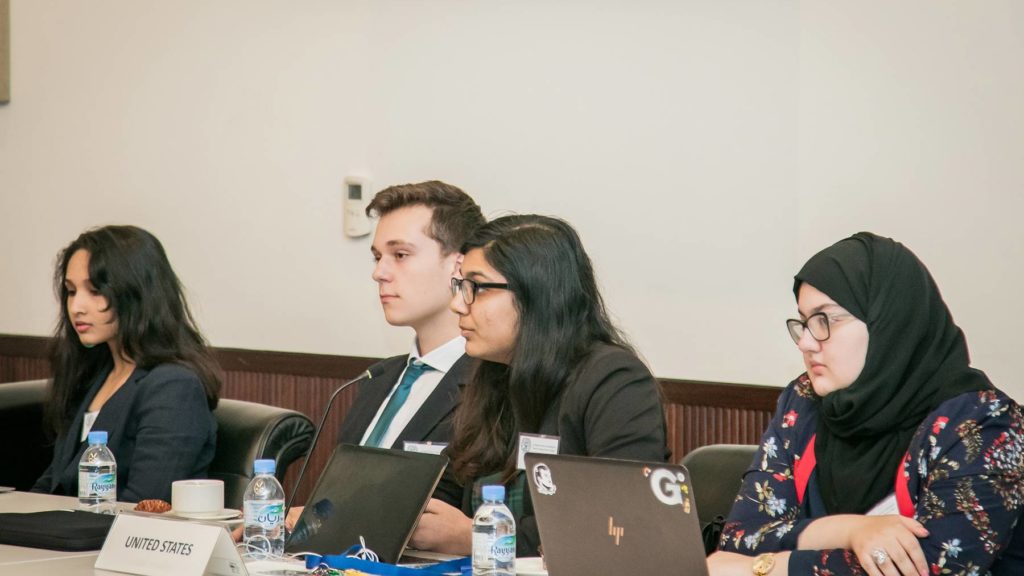Georgetown Students Take On Syrian Conflict in Annual Crisis Simulation

Despite the efforts of consecutive peace initiatives in Geneva, the Syrian conflict is now in its seventh year, with no signs of a political settlement between the warring parties. Taking on the role of key stakeholders in the ongoing conflict, students at Georgetown University in Qatar (GU-Q) took part in their own hypothetical Syrian peace conference through the university’s annual Crisis Simulation exercise, earning course credit and learning why peace and stabilization has remained elusive for so long.
“This is an unparalleled hands-on experiential learning activity for our students, giving them an understanding of what it takes to bring people with very different views to the table to resolve a conflict. These are critical life skills no matter which career path they pursue,” explained Dr. Christine Schiwietz, GU-Q assistant dean for academic affairs, who co-organizes the simulation with James Seevers, director of studies, the Institute for the Study of Diplomacy (ISD) at Georgetown University in Washington, D.C.
During the course of one week, 28 GU-Q students attended a series of preparatory workshops including modules on the introduction to diplomacy and negotiation theory. On the final day students attended bilateral and multilateral meetings in a simulation of real peace negotiation. Working in teams, they sought to resolve key issues around the fate of the current regime and the opposition, the future of the Kurds, and the presence of foreign military troops.
“We’ve done a series of simulations with students here in Doha over the years. I thought this was one of the very best ones in terms of their level of preparation and their engagement with the issues,” commented Seevers. “The diverse nationalities and background of the student body at GU-Q brings different perspectives to the negotiations.”
Roland McKay, a Rusk fellow and career Foreign Service Officer with the U.S. State Department, was a guest participant who lent his diplomatic expertise to the day of debate and strategic negotiations. Noting the common assumption that the most powerful player in a conflict has the upper hand, he said, “some aspects of negotiation can only be grasped by actually doing it. At GU-Q’s Crisis Simulation, students learned how weakness can actually be a strength.”
The student teams worked hard, but no peaceful resolution was achieved. For McKay, that’s beside the point. “There’s no single takeaway here. For these students, the most important lesson is learning to decide for themselves how much importance they give to factors like emotions, and objectives, power and leverage.”
Another key lesson, in his view, is the ability to work effectively within time limits. “Things can always be solved if time is no constraint, but here in the negotiation we have a day. In a real negotiation in real life, whether it’s a business deal or a summit, there’s time pressure. So that skill, of having to draft fast, decide quickly – is critical for work in any organization.”
McKay previously served as a political officer with the Syria Transition Assistance Response Team and as a special assistant to Secretary of State Rex Tillerson. “It’s my first time on Georgetown’s Doha campus, and I was very impressed with the level of the students, and how quickly they grasped key power dynamics in the Syria conflict,” he added.
For Amna Falah, a junior majoring in International Economics who represented the role of the U.S., the diplomacy exercise hit close to home. “I think the topic was amazing. We have several Syrian students, and the cause is very important to many of us non Syrians since it’s close geographically,” she said, adding: “Many of us feel some responsibility and desire to reach a solution as soon as possible in order to end the suffering of the Syrian people and refugees most affected by this horrifying war.”
For Amna, the involvement of an active duty diplomat added to the realism of the negotiations. “The presence of a professional diplomat this year really made a difference and made it all more believable.”
In the final module on the last day of the simulation, student participants and organizers gathered for a debriefing session to discuss the outcome of the negotiations and to share lessons learned along the way.